小学英语一般将来时
小学英语一般将来时

一般将来时1、第一人称(we 和I)用shall:shall+动词原形意义: 一般单纯地表示将来某个时间将要发生的动作或存在的状态。
肯定句:We shall go on the Pearl River.否定句:We shall not/shan’t go on the Pearl River.一般疑问句:-- Shall we go on the Pearl River?--Y es, we shall. /No, we shall not/shan’t.特殊疑问句:--When shall we go on the Pearl River?--Tomorrow morning.2、第一、二、三人称用will: will+动词原形意义: 一般单纯地表示将来某个时间将要发生的动作或存在的状态。
肯定句:He will go on the Pearl River.否定句:He will not/won’t go on the Pearl River.一般疑问句:--Will he go on the Pearl River?--Y es, he will. /No, he won’t.特殊疑问句:--When will he go on the Pearl River?--Tomorrow morning.3、第一、二、三人称用be going to+动词原形意义:用来表示近期将要发生的动作或存在的状态,以及计划、安排、打算要做的事。
肯定句:He is going to watch birds there.否定句:He is not/isn’t going to watch birds there.一般疑问句:--Is he going to watch birds there?--Y es, he is. / No, he isn’t.特殊疑问句:--What is he going to do?-- He is going to watch birds there.4、用现在进行时表示表示位置转移的动词(如:go, come, leave, start, arrive等),可用现在进行时表示将来时。
最新人教pep版小学英语毕业专项复习——第四部分 时态精析 第四节一般将来时

A. have
B. is having
C. will have
返回目录
( C )5. Oliver: Are you going to the park? Tom: Yes,
_____.
A. he is
B. I will
C. I am
返回目录
三、Ask and answer. 根据答句写问句。 1. A: __W__h_a_t'_s_t_h_e_w__e_a_th_e_r__li_k_e_t_o_m__o_r_ro_w__?__/H__o_w_'_s_t_h_e
返回目录
3. A: __I_s_s_h_e__g_o_in_g__to__c_o_o_k_d__in_n_e_r_?_____ B: Yes,she is going to cook dinner.
4. A: ___W__h__er_e__a_r_e_y_o_u__g_o_in_g_?_________ B: I'm going to Beijing. 5. A: ___W__h_a_t_a_r_e__y_o_u_g_o_i_n_g__to__d_o_?_____
返回目录
二、一般将来时的句型结构 1. be going to结构 (1) 肯定句:主语+be going to+动词原形+其他。 如: I'm going to go fishing this week. 这周我打算去钓鱼。 Tom's father is going to wash the car today. 今天汤姆的爸爸 打算洗车。
返回目录
( A )3. My mother _____ shopping next weekend.
小学一般将来时讲解

小学一般将来时讲解1. 介绍小学一般将来时是英语语法中的一种时态,用来表示将来发生的行动或事件。
在这种时态中,动作与时间的关系是相对的,即动作将在将来某一时刻发生。
2. 构成小学一般将来时由情态动词 "will" 或 "shall" 加上动词原形构成。
下面是一些例子:- I will go to school.- She will play basketball.- We shall see a movie.3. 肯定句结构小学一般将来时的肯定句结构是:主语 + will/shall + 动词原形+ 其他。
4. 否定句结构小学一般将来时的否定句结构是:主语 + will/shall + not + 动词原形 + 其他。
5. 疑问句结构小学一般将来时的疑问句结构是:Will/Shall + 主语 + 动词原形+ 其他?6. 使用场景小学一般将来时常用于以下场景:- 表示未来的计划或打算:I will go to the park tomorrow.- 表示预测:It will rain later.- 表示意愿或请求:Will you help me with my homework?7. 注意事项在小学一般将来时中,我们要注意以下几点:- 不使用"will"或"shall"来表达对他人的承诺或决定,如"I promise"或"I decide"。
- 在口语中,经常使用"will"而不是"shall"。
- 在第一人称疑问句中,我们可以使用"shall"代替"will",但这并不常见。
希望这份文档对你的小学一般将来时的学习有所帮助!。
小学英语语法时态一般将来时详解

小学英语语法时态一般将来时详解一、概念一般将来时表示将来某一时刻的动作或状态;或将来某一段时间内经常的动作或状态..一般将来时由助动词shall第一人称;will第二、三人称+动词原形构成..美国英语则不管什么人称;一律用will..二、一般将来时的形式●will 常简略为'll;并与主语连写在一起;如:I'll;he'll;it'll;we'll;you'll;they'll..●一般疑问句如用Will you…其简略答语须是Yes;I will或 No;I will not;如用 Shall you…较少见其简略答语须是 Yes;I shall.或 No; I shall not...三、一般将来时的用法1表示将来的动作或状态一般将来时常与一些表示将来的时间状语连用;如:tomorrow明天; next week 下周; from now on从现在开始;in the future将来等..2表示将来经常发生的动作..一般将来时表示将来某一时刻的动作或状态;其表达形式除了“shall第一人称;will第二、三人称+动词原形构成”外;还有以下几种形式..1“to be going to+动词原形”表示即将发生的或最近打算进行的事..例如:①It is going to rain. 要下雨了.. ②We are going to have a meeting today. 今天我们开会..2go;come;start;move;sail;leave;arrive;stay等可用进行时态表示按计划即将发生的动作;例如: I'm leaving for Beijing. 我要去北京..3“be to+动词原形”表示按计划要发生的事或征求对方意见..例如:①Are we to go on with this work 我们继续干吗②The boy is to go to school tomorrow.这个男孩明天要去上学..4“be about to+动词原形”表示即将发生的动作;意为:很快;马上..后面一般不跟时间状语..例如: We are about to leave.我们马上就走..5某些词;如come; go; leave; arrive; start; get; stay 等的一般现在时也可表示将来..①The meeting starts at five o'clock.会议五点开始..②He gets off at the next stop.他下一站下车四、一般将来时特点1shall用于第一人称;常被will 所代替..will 在陈述句中用于各人称;在征求意见时常用于第二人称..Which paragraph shall I read first Will you be at home at seven this evening2be going to +不定式;表示将来..a. 主语的意图;即将做某事..What are you going to do tomorrowb. 计划;安排要发生的事..The play is going to be produced next month..c. 有迹象要发生的事Look at the dark clouds; there is going to be a storm.3be +不定式表将来;按计划或正式安排将发生的事.. We are to discuss the report next Saturday.4be about to +不定式;意为马上做某事.. He is about to leave for Beijing.注意:be about to 不能与tomorrow; next week 等表示明确将来时的时间状语连用..五、一般将来时常见用法1、表示将要发生的动作..例如:I shall go to see a friend this evening.2、shall用于第一人称作主语的问句里;表示征求对方的意见或询问情况..例如:Shall I open the door3、will用于第二人称的问句里;征求对方是否愿意或表示客气的邀请或命令..例如:Will you please read the word4、be going to打算、准备做某事或即将发生的事..例如:We are going to plant trees.这种时态由be的将来时形式+现在分词构成..如主语为第一人称;除在疑问句外will要比shall更常用.可用做一般进行时;也可表示不含意图又未发生的动作..5、be to do按计划安排要发生的事或征求对方意见..例如:When is the swimming pool to open6、be going在go;come;leave;stay等按计划安排要发生的事中..这些动词经常具有趋向性..例如:They are leaving here tomorrow.。
小学英语 一般将来时 句型结构
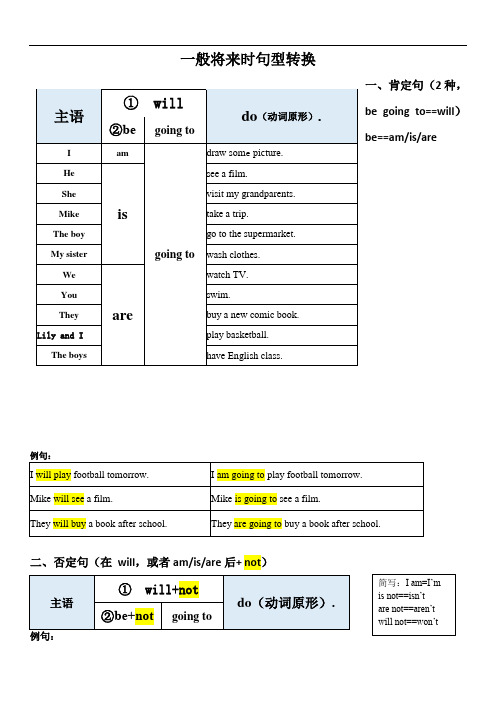
一般将来时句型转换
一、肯定句(2种,
be going to==will )be==am/is/are
二、否定句(在 will ,或者am/is/are 后+ not )
三、一般疑问句(将句子中的will或者am/is/are 提前到句首)
例句:
四、肯定&否定回答
1.will提问
Yes, I/we/he/she/they will .
No, I/we/he/she/they won't.
2.Is/Are提问
Yes,I am. No,I am not.
Yes,he/she is. No,he/she isn't.
Yes,we/you/they are. No,we/you/they aren't.
五、划线提问(根据划线部分确定疑问词)
疑问词+ 一般疑问句
1.They boy is going to play football.——What is the boy going to do?
做的事,用what+某人 do提问2.
划线部分是地点,用where提问
提问
4.The students will play football tomorrow. ——When will the students play football?
划线部分是时间,用when 提问。
小学英语一般将来时

be going to句型的特殊疑问句形式。
疑问词 + be动词 +主语 + going (to) +(动作)+(时间副词)?
常用的疑问词有:
what where when which who how
什么(提问事情) 在哪里 (提问地点) 在什么时候 (提问时间) 选择哪一个(提问人或物) 谁 (提问人) 怎么样 (提问方式)
( B ) 9. We ________ the work this way next time. A. do B. will do C. going to do D. will doing
What is Hui Tailang going to do?
He is going to ski.
What is Lan Yangyang going to do?
He is going to sweep the floor.
What is Xi Yangyang going to do?
一般将来时be going to句式的构成: 主语 + be going to +动词原形/地方 +(将来时间)
visit 1. We are going to grandparents tomorrow. 2. Sheisgoing to go soon. read 3. He is going to books this evening. 4. My parents is are going to Beijing next week. is改为 5. John is go to the park.
①通常用will + V说或写都尽量使用“I’ll, You’ll, He‘ll , She’ll , It’ll, We’ll , They’ll …”的简缩形式 否定形式 :will not = won’t I won‘t see him again.
小学一般将来时知识点总结

小学一般将来时知识点总结引言小学英语是孩子们学习英语的起点,学好小学英语对以后的学习起到重要的基础作用。
其中,学习一般将来时是非常重要的一部分。
掌握一般将来时的用法可以帮助孩子们表达将要发生的事情,培养他们的语言表达能力。
本文将总结小学一般将来时的知识点。
一般将来时的定义一般将来时表示将要发生的动作或存在的状态。
它通常用于描述将来的事件、习惯或计划等。
一般将来时的构成一般将来时由助动词“will”和动词原形构成。
通常,在句子中,助动词“will”位于主语之后,动词原形位于助动词之后。
例如:•I will go to the park tomorrow.•She will eat dinner at home tonight.一般将来时的用法表示将要发生的事情一般将来时通常用于表示将来要发生的事情。
例如:•I will visit my grandparents next week.•We will have a party on Saturday.表示将来的打算或意愿一般将来时还可以用于表示将来的打算或意愿。
例如:•Tom will study hard to pass the exam.•They will help the homeless people.表示将来的预测有时,一般将来时也可以用于表示将来的预测。
例如:•It will rain tomorrow.•She will become a famous singer in the future.表示意见或推断一般将来时还可以用于表示意见或推断。
例如:•I think he will be successful in his career.•They believe the team will win the game.表示习惯或常态一般将来时还可以用于表示习惯或常态。
例如:•They will usually go for a walk after dinner.•He will always help his classmates.一般将来时的注意事项在使用一般将来时时,有一些需要注意的事项。
小学五年级下册英语重点语法:一般将来时

◆ 一般疑问句:Be动词 + 主语 + going to+动原+其它?
如:Are they going to have an English test nexபைடு நூலகம் week?
他们下周有英语考试吗?
◆ 特殊疑问句:
特殊疑问词+ be动词 + 主语 +going to+动原+其它?
★一般将来时态的定义:
表示将要发生的动作或存在的状态。
如: I will see a film tomorrow.
我明天将去看一场电影。
He will be 10 years old next year.
明年他就十岁了。
★一般将来时态的标志词:
1、tonight(今晚)
2、soon(不久;很快)
3、tomorrow系列:tomorrow morning/afternoon/evening
the day after tomorrow(后天)
4、next系列:next week/ next year/ next Monday...
5、一段时间+later系列:five years later/ three days later…
6、in + 一段时间系列:in five minutes/in two weeks…
如:They are going to have an English test next week.
他们下周有一场英语考试。
◆ 否定句:主语 + be动词+ not +going to+动原+其它.
如:They aren't going to have an English test next week
小学英语一般将来时

一般将来时:
定义:事情发生在将来的时间中。 构成: will + 动词原形
be going to
+
动词原形
构成:will+动词原形
be going to+动词原形
I am going to listen to music.
I will listen to music.
一般将来时句式
否定句: will + not
疑问句: will 放开头 肯定回答:Yes,I will 否定回答:No, I won’t
What will they do ?
They will fly a kite.
They will not fly a kite.
Will will
1/ Sam will do the housework .(变否定句和一般疑问句) __________________________________
2、They will go swimming.(变一般疑问句) _________________________________
3、Mike will go to the park.(变否定句) __________________________________ 4、 I’m going to have a picnic.(翻译句子) _________________________________ 5、I will play with my friends.(变疑问句并作肯定回答) _________________________________
2、他周末准备去拜访他的祖父母。
He will visit his grandparents on sunday.
小学英语:全面解析一般将来时语法时态

全面解析:一般将来时1.Is your sister going to ________?A.swam B.swimming C.swim全面解析:你的妹妹打算去吗?A游泳,动词过去式;B游泳,动词ing形式;C游泳,动词原形,本句是一般将来时,构成be going to+动词原形。
故选C。
2.Joy is ________ to have a party.A.goes B.go C.going全面解析:Joy.....举行一场聚会。
be going to结构“打算做某事”,构成一般将来时。
故答案为:C。
3.Charlie _______ here next month.A.isn't working B.doesn't workingC.isn't going to working D.won't work全面解析:查理下个月将不在这里上班。
next month表示下个月,句子时态用一般将来时态,谓语部分应是will do结构或be going to do结构,否定句在will或be后加not。
A. isn't working结构错误,不符合题意,B. doesn't working结构错误,不符合题意,C. isn't going to working结构错误,不符合题意,D. won't work将不会工作,符合题意。
故选D。
4.She ____study Science.A.is going B.going to C.is going to D.is go to全面解析:她打算学科学。
be going to+动词原形,构成一般将来时,故选C。
5.After school, we camping.A.are going to go B.going to go C.go to全面解析:放学后,我们野营。
A选项是be going to结构,用在这里正确;B选项如果用在这里,缺少be动词。
小学六年级英语一般将来时四个句型

一、肯定句——主语+ be +going to do主语+will dobe动词包括:am,are,is例. I am going to play football tomorrow. 我明天将要踢足球。
I will play football tomorrow.=I plan to play football tomorrow.He is going to watch TV tomorrow morning. 他明天早上打算看电视。
He will watch TV tomorrow morning.=He plans to watch TVtomorrow morning.She is going to visit her teacher next week. 她下周要去探望她老师。
She will visit her teacher next week.=She plans to visit her teacher next week.练习:1.他今晚计划读书。
二、否定句——主语+be +not +going to do主语+will +not +do例.I am not going to play football tomorrow.I will not going to play football tomorrow.He is not going to watch TV tomorrow morning.He will not watch TV tomorrow morning.练习:三、一般疑问句——Be +主语+going to doWill +主语+do提示:一般疑问句就是把肯定句中的be和will放在句首例.Are you going to play football tomorrow?Will you play football tomorrow?Is he going to watch TV tomorrow morning?Will he watch TV tomorrow morning?Is she going to visit her teacher next week?Will she visit her teacher next week?练习:四、特殊疑问句——疑问词+be +主语+going to do疑问词+will +主语+do疑问词包括:what,when,how,where,why提示:特殊疑问句=疑问词+一般疑问句——先确定用哪个疑问词例.What are you going to do tomorrow? What will you do tomorrow?When are you going to watch TV? When will you watch TV?Where are you going tomorrow? Where will you go tomorrow?Why is she going to visit her teacher? Why will she visit her teacher?。
(完整版)小学英语一般将来时
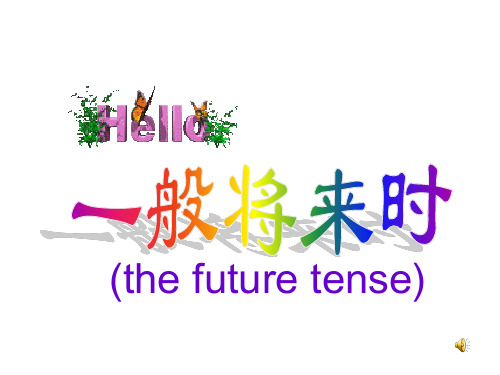
我下周三将要做家务。I will do the housework next Wednesday.
我下周四将要听音乐。I will listen to music next Thursday.
比较下列句子:
1. 我打篮球。 I play basketball.
3. 明天我们要下象棋。We are going to play chess tomorrow.
4. 明天他们要踢足球。They are going to play football tomorrow.
5. 明天露西要听音乐。Lucy is going to listen to music tomorrow.
写出同义句: 1. I am going to eat. → I _wi_ll _ea_t . 2. He is going to eat. → He _w_ill _e_at. 3. She is going to play piano. → She _wi_ll _pl_aypiano. 4. The cat is going to jump. → The cat w_ill _ju_m__p. 5. We are going to fly kites tomorrow. →We _w_ill _fly_k_ite_s tomorrow.
(the future tense)
•I’ m going to buy a book. •I’ m going to bake a cake. •I’ m going to walk near a lake. •We’ re going to take a trip. •I’ m going outside to play. •I’ m going to have a good day.
小学生英语语法:一般将来时

四. 基本句型 1. 肯定句:主语 + be going to + v.原型+其它 I am going to visit Australia. She is going to buy some clothes.
They are going to play computer games.
2.否定句:在 be / will 后加not
7.Mother ____me a nice presrnt on my next birthday. A. is going to gives B. is going to give C. gives
B
B
8.
B a concert next Satyrday?
A.There is going to be
三. 与一般将来时连用的时间状语 this afternoon / evening, tonight 今 evening )明天… the day after tomorrow 后天 next week / Sunday / month / year下周/… soon 很快 不久 in three days 三天后 in the future 将来
I am not going to visit Australia. She isn’t going to buy some clothes.
3.一般疑问句句:将 be / will 动词提前。 (主语是第一人称I 时,变一般疑问句时 将I 变you) 1)I am going to visit Australia. ---Are you going to visit Australia? ---Yes, I am / No, I am not. 2)She is going to buy some clothes. --Is she going to buy some clothes? --Yes, she is. / No, she is not.
小学英语语法句型转换-一般将来时(全国通用版)
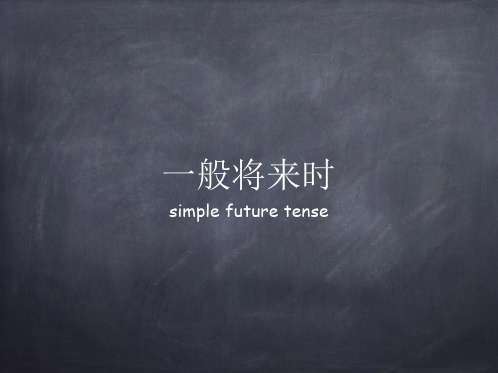
—Yes, I will. 是的,我要去。
—Will your grandpa go to learn English
this Sunday?
这周日你爷爷将去学英语吗?
—No, he won’t. 不,他不去。
练习
将下列陈述句变成否定句和一般疑问句,
一般疑问句作肯定回答和否定回答
(2) 只用be going to不用will的情况
1⃣️表示按计划或安排要发生的动作,一般已经做过
事先安排,其实现的可能性比较大,主语通常是人
We are going to have a class meeting
this afternoon.
2. be going to 和 will的区别
(2) 只用be going to不用will的情况
afternoon.
今天下午我哥哥将要去去买一双鞋。
一般将来时的句式结构
(2)否定句:will+ not = won't
主语+ will+ not +动词原形+其他.
如:
I will not go to plant trees this weekend.
这个周末我将不去种树。
They won’t go to climb mountains this week.
练习
I bought a new bike.
(用tomorrow 改写句子)
am going
buy ______ a new bike
to ______
I _____
_____
tomorrow.
看演出
We are going to see a play tomorrow.
小学英语一般将来时
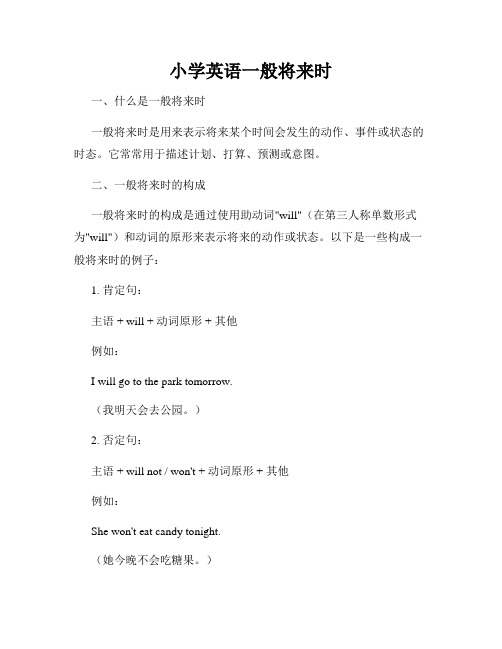
小学英语一般将来时一、什么是一般将来时一般将来时是用来表示将来某个时间会发生的动作、事件或状态的时态。
它常常用于描述计划、打算、预测或意图。
二、一般将来时的构成一般将来时的构成是通过使用助动词"will"(在第三人称单数形式为"will")和动词的原形来表示将来的动作或状态。
以下是一些构成一般将来时的例子:1. 肯定句:主语 + will + 动词原形 + 其他例如:I will go to the park tomorrow.(我明天会去公园。
)2. 否定句:主语 + will not / won't + 动词原形 + 其他例如:She won't eat candy tonight.(她今晚不会吃糖果。
)3. 疑问句:Will + 主语 + 动词原形 + 其他?例如:Will they come to the party?(他们会来参加派对吗?)三、一般将来时的使用场景下面是一些小学英语中常见的使用一般将来时的场景:1. 表示计划或打算:I will visit my grandparents next month.(我下个月会去拜访我的祖父母。
)2. 表示预测或推测:It will rain tomorrow.(明天会下雨。
)3. 表示意愿或承诺:I will help you with your homework.(我会帮你做作业。
)4. 表示未来常态:The school will start at 8:00 AM tomorrow.(明天学校将会在早上8点开始。
)5. 表示请求、命令或建议:Will you please pass me the book?(你能给我递一下那本书吗?)四、注意事项1. "will"后面的动词使用原形形式。
2. 助动词"will"可以缩写成"’ll"。
小学英语语法之一般将来时

一般将来时一、一般将来时:表示将来某个时间要发生的动作、事情,或存在的状态。
二、.结构:▲(1)主语+will/shall+动词原形+(其他)shall用于主语是第一人称单数,will在陈述句中用于各人称.I shall do my homework tomorrow morning.I/He/She/They will do my/his/her/their homework tomorrow morning. He will get up soon.I will=I Shall=I’ll★在表示客观事实的时候只能用此结构。
(1).It will rain tomorrow.明天将要下雨.(2).It will be Teachers'Day the day after tomorrow.后天将是教师节.(3).My birthday will come.我生日将要到了.▲(2)主语+am/is/are going to+动词原形+(其他)a.主语的意图,即将做某事。
I am going to Shanghai tomorrow.b.计划,安排要发生的事。
The play is going to be produced next month。
c.有迹象要发生的事。
Look at the dark clouds,there is going to be a storm.(3)主语+be+to+动词原形+(其他),表示按计划要发生的事或征求对方意见。
We are to discuss the report next Saturday.(4)主语+am/is/are about to+动词原形,意为马上做某事。
He is about to leave for Beijing.(5)主语+be+v-ing,表示将来,表示按计划即将发生的动作,这类动词有go,come,start,move,sail,leave,arrive,stay,live,fly。
小学英语语法一般将来时
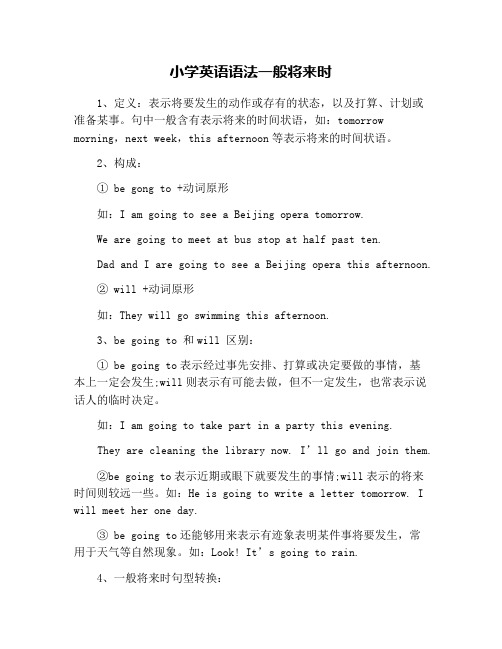
小学英语语法一般将来时1、定义:表示将要发生的动作或存有的状态,以及打算、计划或准备某事。
句中一般含有表示将来的时间状语,如:tomorrow morning,next week,this afternoon等表示将来的时间状语。
2、构成:① be gong to +动词原形如:I am going to see a Beijing opera tomorrow.We are going to meet at bus stop at half past ten.Dad and I are going to see a Beijing opera this afternoon.② will +动词原形如:They will go swimming this afternoon.3、be going to 和will 区别:① be going to表示经过事先安排、打算或决定要做的事情,基本上一定会发生;will则表示有可能去做,但不一定发生,也常表示说话人的临时决定。
如:I am going to take part in a party this evening.They are cleaning the library now. I’ll go and join them.②be going to表示近期或眼下就要发生的事情;will表示的将来时间则较远一些。
如:He is going to write a letter tomorrow. I will meet her one day.③ be going to还能够用来表示有迹象表明某件事将要发生,常用于天气等自然现象。
如:Look! It’s going to rain.4、一般将来时句型转换:肯定句/否定句/一般疑问句及回答She is going to have a picnic tomorrow./She isn’t going to have a picnic tomorrow./—Is she going to have a picnic tomorrow?—Yes, she is. / No, she isn’t.They will go swimming this afternoon./They willnot(wo n’t) go swimming this afternoon./—Will they go swimming this afternoon?—Yes, they will. / No, they won’t.。
- 1、下载文档前请自行甄别文档内容的完整性,平台不提供额外的编辑、内容补充、找答案等附加服务。
- 2、"仅部分预览"的文档,不可在线预览部分如存在完整性等问题,可反馈申请退款(可完整预览的文档不适用该条件!)。
- 3、如文档侵犯您的权益,请联系客服反馈,我们会尽快为您处理(人工客服工作时间:9:00-18:30)。
Be动词该怎么随主语变化呢?
当主语是“I”的时候,后面的be动 词要用“am”
I am
I am going to play chess.
Be动词该怎么随主语变化呢?
当主语是“you” “we”的时候,后面 的be动词要用“are”
You We
are
You are going to swim. We are going to swim.
主语+ be going to+ 动词原形+ (宾语)+ 时间状语
谓语
3
注意要点
1 be going to 的“be”指的是Байду номын сангаас语中的 be动词。
am
Be 动词
is
are
2 Be动词需要根据主语的人称变化而变化
I be going to play chess this weekend. He am going to go hiking on Sunday. We is going to do homework.
I abme going to play chess this weekend. He aims going to go hiking on Sunday. We airse going to do homework.
主语
Alice Peter
单个的名字
is
单个人
My sister His brother
一般将来时 be going to
一般将来时
定义definition 基本结构 form 注意要点 tips 练习 practice
1
定义
表示将来某一时刻的动作或状态,或将来某一段时间内经常 的动作或状态。
将来
future now
2
基本结构
She is going to visit her grandparents this weekend. I am going to play chess with my father.
Be动词该怎么随主语变化呢?
当主语是“he” “she” “it”的时候, 后面的be动词要用“is”
He isHgoeing to play basketball.
She iSs hgoeing to sinigsa song.
It is Igoting to run.
2 Be动词需要根据主语的人称变化而变化
A+B A, B and C
多个名字
are
多个人(复数)
My sisters Our teachers His brothers
